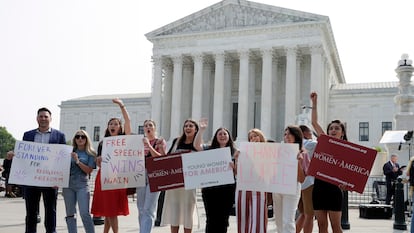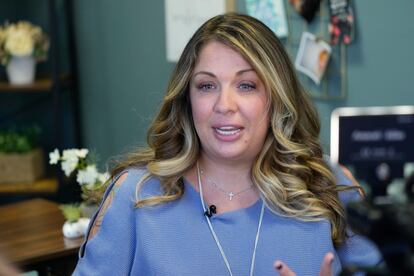The US Supreme Court’s first ‘license to discriminate’
Liberal justices, LGBTQ+ activists and civil rights organizations fear the sentence in favor of a designer who refuses to make websites for same-sex couples could have far-reaching consequences


A prefabricated-looking case has allowed the conservative majority of the U.S. Supreme Court to deal a blow to the LGBTQ+ community. The ruling handed down last Friday in favor of a Colorado designer who refuses to make websites for same-sex couples is, according to the dissenting vote of the three liberal judges, “a license to discriminate” — the first ever of granted by the U.S. high court. What’s more, judges, civil rights organizations and LGBTQ+ activists fear that it could lead to many more cases of discrimination.
The graphic designer Lorie Smith has never made wedding websites. Nor has she ever been hired by a same-sex couple to make one. But Smith says she wants to make wedding websites in the future, as long as she can refuse to provide that service for same-sex couples. More still, she doesn’t just want to turn down requests from same-sex couples, she wants to publicly announce on the company website her intention to discriminate. With the legal support of the conservative organization Alliance Defending Freedom, Supreme Court justices sided with her on the grounds of freedom of expression.
The United States has a long history of discrimination, particularly against the Black population. Almost all states have laws that require public establishments to serve customers regardless of their race, gender and beliefs. The Supreme Court has been consecrating the right to equal treatment throughout its history. Until the sentence last Friday.
“In this pivotal moment, the Court had an opportunity to reaffirm its commitment to equality on behalf of all members of society, including LGBT people. It does not do so,” Supreme Court Justice Sonia Sotomayor wrote in her dissenting opinion, which was supported by fellow liberal justices Elena Kagan and Kentanji Brown Jackson.
Sotomayor’s dissenting vote is a strong amendment to the sentence handed down by the conservative majority: “Today is a sad day in American constitutional law and in the lives of LGBT people. The Supreme Court of the United States declares that a particular kind of business, though open to the public, has a constitutional right to refuse to serve members of a protected class. The Court does so for the first time in its history,” she wrote.
“By issuing this new license to discriminate in a case brought by a company that seeks to deny same-sex couples the full and equal enjoyment of its services, the immediate, symbolic effect of the decision is to mark gays and lesbians for second-class status. In this way, the decision itself inflicts a kind of stigmatic harm, on top of any harm caused by denials of service. The opinion of the Court is, quite literally, a notice that reads: ‘Some services may be denied to same-sex couples,’” she argued.
The liberal judges justices argue that the case cannot be understood outside the context in which it has arisen. This year alone, more than 525 anti-LGBTQ+ bills have been introduced in 41 states, and more than 75 have become law, according to data from the Human Rights Campaign (HRC), the nation’s largest civil rights organization. “We are living in a state of emergency,” warned HRC.
One of the dangers of the sentence is that it does not make it clear when the right to freedom of expression can be invoked as the grounds to discriminate against someone. In the case of a same-sex wedding, can the photographer refuse to provide their services? Or the florist? Or caterer? This ambiguity is the breeding ground for future conflicts.
U.S. President Joe Biden, who stated “no person should face discrimination simply because of who they are or who they love,” warned of these risks. “While the court’s decision only addresses expressive original designs, I’m deeply concerned that the decision could invite more discrimination against LGBTQI+ Americans,” he said. “More broadly, today’s decision weakens long-standing laws that protect all Americans against discrimination in public accommodations — including people of color, people with disabilities, people of faith, and women.”
Biden is openly challenging the Supreme Court which, with a 6-3 conservative majority achieved during the presidency of Donald Trump, is undertaking far-reaching changes. In the court’s conservative revolution, it has repealed the federal right to abortion, strengthened the right to bear firearms, hindered the fight against climate change, dealt a fatal blow to affirmative action in college admissions, and taken other decisions that impact the lives of Americans.
In Friday’s case, the conservative justices sided with the designer, arguing that Colorado could not force her to say something with which she does not agree. The liberals replied that no one was forcing her, that she can offer websites that include biblical quotes and say that the only true marriage is between a man and a woman, but what she should not be able to do, if she wants to have a business open to the public, is to deny to work for clients on the basis of their sexual orientation.

In the dissenting vote, Judge Sotomayor argues that the sentence “reminds LGBT people of a painful feeling that they know all too well: There are some public places where they can be themselves, and some where they cannot.” She continued: “Ask any LGBT person, and you will learn just how often they are forced to navigate life in this way. They must ask themselves: If I reveal my identity to this co-worker, or to this shopkeeper, will they treat me the same way? If I hold the hand of my partner in this setting, will someone stare at me, harass me, or even hurt me? It is an awful way to live. Freedom from this way of life is the very object of a law that declares: All members of the public are entitled to inhabit public spaces on equal terms.”
“This decision by the Supreme Court is a dangerous step backward, giving some businesses the power to discriminate against people simply because of who we are,” added HRC president Kelley Robinson. In addition to highlighting the risks of the sentence, HRC also pointed out that federal laws still protect the LGBTQ+ community. “Despite our opponents claiming this is a major victory, this ruling does not give unfettered power to discriminate. This decision does not mean that any LGBTQ+ person can be discriminated against in housing, employment or banking — those protections remain enshrined with federal law,” said Robinson.
The headquarters of Smith’s design company Creative 303 is in Colorado, which is governor by Jared Polis, who in 2018 became the first gay man elected governor in the United States. “Unfortunately, Americans have seen the Supreme Court become increasingly obsessed with taking away freedoms,” said Polis in a statement following the verdict. “These rulings run counter to Colorado values and we will continue to fight against bigotry and discrimination in all their ugly forms.”
The liberal Supreme Court judges point out that the ruling threatens to “balkanize” the market and allow the exclusion of other groups from many services. For example, a web designer might refuse to create a wedding website for an interracial couple. “How quickly we forget that opposition to interracial marriage was often because ‘Almighty God... did not intend for the races to mix,’” Sotomayor argued in the dissenting opinion.
What’s more, the grounds for discrimination do not even need to have a religious basis, since the case was won on the grounds of freedom of expression. “A stationer could refuse to sell a birth announcement for a disabled couple because she opposes their having a child. A large retail store could reserve its family portrait services for “traditional” families. And so on,” explained Sotomayor.
Neil Gorsuch, who penned the ruling for the conservative majority, criticized these examples: “The dissent spends much of its time adrift on a sea of hypotheticals about photographers, stationers, and others, asking if they too provide expressive services covered by the First Amendment. But those cases are not this case,” he wrote.
HCR, however, reminded Gorsuch that this very case is based on a hypothesis. No same-sex couple had asked Smith for a website for their wedding, it is built on assumptions: “Make no mistake, this case was manufactured by the Alliance for Defending Freedom to create a new license to discriminate against LGBTQ+ people,” said Robinson.
Sign up for our weekly newsletter to get more English-language news coverage from EL PAÍS USA Edition
Tu suscripción se está usando en otro dispositivo
¿Quieres añadir otro usuario a tu suscripción?
Si continúas leyendo en este dispositivo, no se podrá leer en el otro.
FlechaTu suscripción se está usando en otro dispositivo y solo puedes acceder a EL PAÍS desde un dispositivo a la vez.
Si quieres compartir tu cuenta, cambia tu suscripción a la modalidad Premium, así podrás añadir otro usuario. Cada uno accederá con su propia cuenta de email, lo que os permitirá personalizar vuestra experiencia en EL PAÍS.
¿Tienes una suscripción de empresa? Accede aquí para contratar más cuentas.
En el caso de no saber quién está usando tu cuenta, te recomendamos cambiar tu contraseña aquí.
Si decides continuar compartiendo tu cuenta, este mensaje se mostrará en tu dispositivo y en el de la otra persona que está usando tu cuenta de forma indefinida, afectando a tu experiencia de lectura. Puedes consultar aquí los términos y condiciones de la suscripción digital.








































